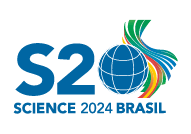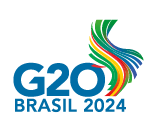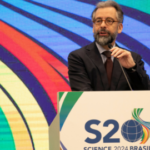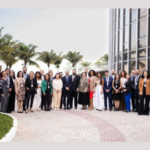S20 Summit Brings Science Recommendations to the G20
Marcos Torres for ABC/S20
On July 1 and 2, the Science20 Summit, the G20’s engagement group for science and technology, met in Rio de Janeiro. As part of Brazil’s rotating presidency, the Brazilian Academy of Sciences (ABC) is leading this year’s discussions. The meeting formulated the basis for the group’s official communiqué, addressed to the G20 Summit in November. The final document is expected to be released after July 19, but a preview of the recommendations can already be seen here.

The S20 Summit in Rio de Janeiro discussed each paragraph of the final document to be presented to the G20.
Opening of the Summit
Ambassador Mauricio Lyrio of Itamaraty opened the meeting by reminding that the objective of Brazil’s rotating presidency in the G20 is to place development at the center of the debate. Lyrio is Brazil’s chief representative in the discussions and brought the country’s priorities: forming a global alliance against hunger, implementing necessary changes to combat climate change, and reforming international institutions to strengthen multilateralism.
Next, political scientist Tatiana Berringer, leader of the G20 Finance Track, brought some of the proposals developed during Brazil’s presidency. Among them are public policy recommendations against inequality, developed from successful examples around the world; proposals for international cooperation on taxation and combating tax evasion; prioritization of the idea of climate justice in discussions on energy transition; and debt relief for countries through investments in health.
Celso Pansera, president of the Funding Authority for Studies and Projects (Finep), stated that the meeting “is an important opportunity for Brazil to discuss its tasks, objectives, and duties with the main academies in the world.” Finep was responsible for funding this year’s meeting.
The executive secretary of the MCTI, Luis Fernandes, stated that the country advocates for a more open and fair science, seeking the best models and practices to achieve this. He believes that the imbalance in scientific production accelerates inequality. “The idea of two worlds in science, one central and one peripheral, is contrary to the scientific spirit. We call on the world’s scientific agencies to change this perspective.”
ABC President Helena Nader explained the S20 2024 work process and the five thematic groups (see below). Nader raised another issue that permeates all global challenges: the demographic transition. “Most G20 countries are aging, with fewer people of working age. Is science taking this into account? Are our governments taking this into account?” she asked.

Helena Nader, President of ABC, led the discussions
Working Groups and Preliminary Recommendations
Under ABC’s leadership, S20 2024 established five priority themes and designated a multidisciplinary working group for each. The groups met throughout the first semester and developed their recommendations, which were presented during the Summit.
Artificial Intelligence: Ethics, Social Impact, Regulation, and Knowledge Sharing
ABC full member Virgilio Almeida led the working group on AI. He stated that the main concerns raised by the participants were about ethics and regulation. It is consensus that AI will be central to technological development in areas such as health and education, but the technology carries environmental and social risks, such as increased energy demand and inequalities, as well as drastic changes in the labor market, which cannot be ignored.
Some proposed recommendations are:
- International cooperation to create large and quality databases.
- Investment in computational infrastructure and training of personnel for AI use in various fields.
- Evaluate the creation of shared regional centers with AI infrastructure.
- Create flexible and adaptable policies, rooted in shared ethical principles, to ensure workers’ rights in an AI-driven economy.
- Establish intergovernmental structures to oversee AI technologies that may operate beyond human control.
Bioeconomy: Shaping a Sustainable Planet
The leader of the Bioeconomy working group was ABC full member Adalberto Luis Val. Participating virtually, he reminded that the planet is heading towards an environmental point of no return, and to contain it, we need to change our economic bases to focus on sustainable practices. But what exactly is meant by bioeconomy?
Answering this question was the first step in the discussions. The following definition was agreed upon: Bioeconomy is based on the supply of goods derived from renewable biological resources (biological products, food, bioenergy, health, and pharmaceutical inputs) encompassing traditional knowledge and practices and in line with the United Nations Sustainable Development Goals.
Some proposed recommendations are:
- Support cutting-edge research to boost bioenergy and green advancements, improving innovations in biogenic raw materials, bioenergy, and other biomass materials, forests, plants, and microorganisms from native biodiversity in different biomes.
- Promote sustainable and inclusive bioeconomic models, enabling innovations driven by local populations and protecting traditional knowledge with a focus on using local resources to promote regional economic growth.
- International cooperation is essential to share knowledge and implement programs that improve quality of life and protect natural resources worldwide. Create a G20 policy for countries to implement bioeconomy programs by investing in social and technological innovations.
Energy Transition: Renewable Energies, Economic and Social Considerations
The leader of the working group on energy transition was Academician Alvaro Prata. He reminded that the transition to renewable energies is crucial to achieve sustainable development goals, especially those related to climate change and environmental degradation.
Currently, efforts in this regard involve adopting various types of alternative energies – solar, wind, hydroelectricity, hydrogen, geothermal, biofuels, ocean, and nuclear – as well as efforts for carbon capture and storage. The proportion between each of these actions varies among countries.
Some proposed recommendations are:
- Social and economic considerations should include job creation, technological advancements, equitable access to energy, public engagement, and environmental justice.
- Carbon capture and storage, coupled with market-based solutions – such as the carbon market – should be considered as efficient alternatives to encourage the transition.
- Public awareness, education, and stakeholder engagement are necessary to achieve social acceptance and support for renewable energies.
- Improving energy efficiency is critical for emission mitigation.
- Implement a continuous international dialogue with constant updates and sharing of best practices among countries.
Health Challenges: Quality, Equity, Access, and Preparedness for Epidemics and Climate Change
The health working group was led by Academician Patricia Bozza. She stated that there is consensus on the need to develop more equal, sustainable, and resilient health systems, and also to promote healthier lifestyles among the global population.
Among the various challenges, Bozza highlighted that mental health is still neglected and that making it a priority would significantly contribute to global well-being with economic and social impacts. The impact of climate change was also emphasized, affecting food production, air and water quality, with particular risk in developing countries. Additionally, rising temperatures also favor the emergence of new diseases.
Some proposed recommendations are:
- Ensure global access to vaccines, medicines, and diagnostics for all. Promote local and regional sustainable production through research reinforcement, knowledge sharing, and technology transfer.
- Strengthen global surveillance, open science, and information sharing for early detection of public health emergencies.
- Promote digital health and technological transformations in health.
- Prioritize mental health care, especially for vulnerable groups, addressing issues such as violence and substance abuse.
- Address the effects of climate change on the emergence of new diseases through incentives for monitoring, research, and environmental management.
Social Justice: Promoting Inclusion, Eradicating Poverty, and Reducing Inequalities
The leader of the Social Justice working group was Academician Ruben Oliven. He reminded that science is a social practice that requires constant ethical consideration of its consequences. Scientific knowledge must be integrated into political actions, always with the spirit of “leaving no one behind.” In this sense, science should be used as a mechanism to confront stereotypes and break down social barriers.
Some proposed recommendations are:
- People should be at the center of all social, economic, and development policies.
- Consider reducing inequalities as an ethical imperative, combating violence, intolerance, and social divisions, and reinforcing the values of trust and solidarity.
- Expand infrastructure for universal internet access; improve digital literacy to ensure all segments of society benefit from digital advancements.
- Seek scientific advancement with ethical considerations and awareness of consequences; integrate scientific knowledge into development strategies to combat poverty and exclusion.
- Address scientific misinformation in digital media by developing national, regional, and global strategies involving scientific communities and civil society.
The final document is expected to be released after the signatures of the Academies, after July 19.
